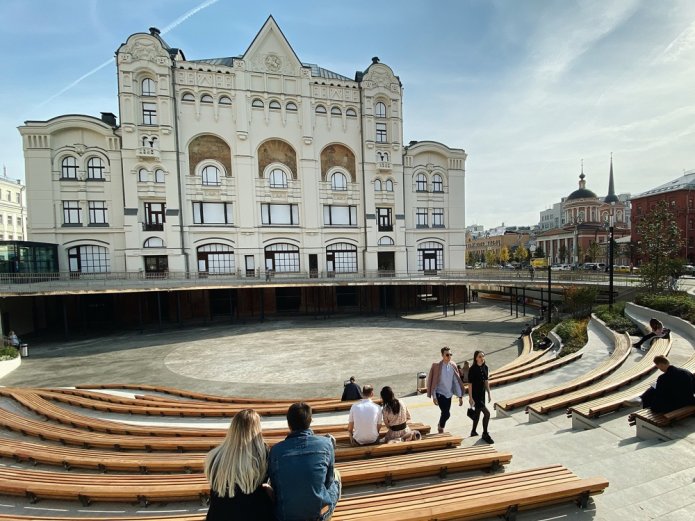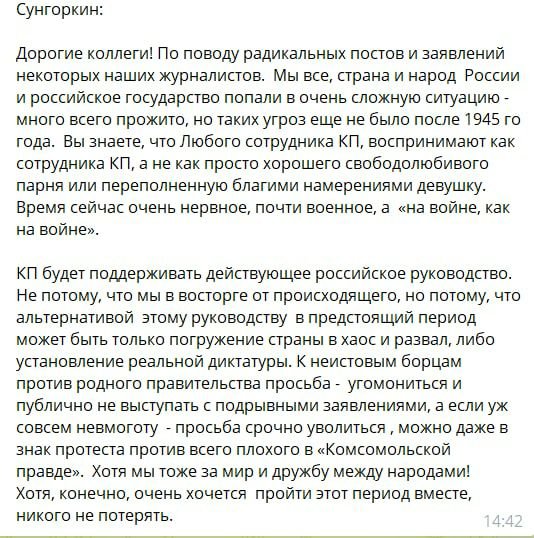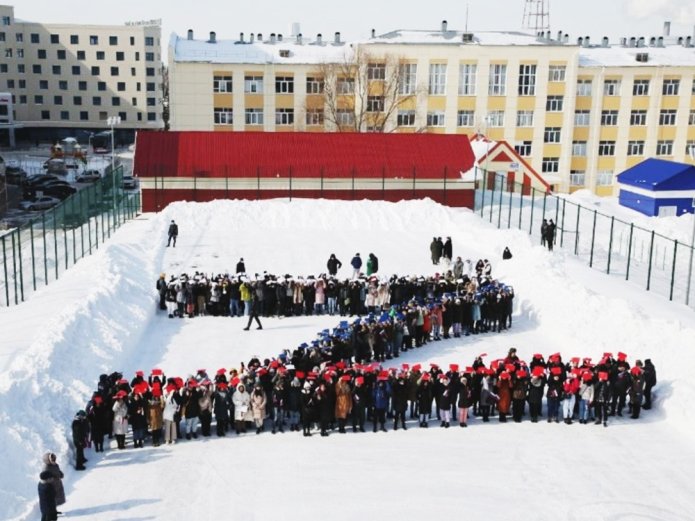After the outbreak of hostilities in Ukraine, protests took place all over Russia, many people began to speak out on social media against the war. Some of them faced pressure at work: some were forced to quit, some were put under unbearable working conditions. We are telling how people defend their right to work and to their political stance.
At the end of March, the management gathered the team of the visitor services center of the Polytechnic Museum in the meeting room. The meeting was attended by both ordinary employees and the head of the department.
«The management said that we now face a choice: either we stop expressing our civic position — they meant going to [anti-war] protests, posts, likes and reposts on social media, — or we leave the museum. We were asked to think and make a decision. At the same time, we were promised that in each case the conditions of dismissal would be discussed, » says Anya, a former employee of the center of work with museum visitors.
Anya, like her colleague Valya, decided to quit. They did not want to compromise and told their superiors that they planned on leaving.
The girls knew that when an employee leaves at their own request, they do not receive any additional payments, except for the payment of the unused part of the vacation and the salary for the current month.
«We understood that no organization can simply ask an employee to quit. More precisely, they can ask to, but if the employee refuses, they can either be cut back on employees or come up with some other solution. It seemed logical and honest to us that the management would meet us halfway, » explains Valya.

The issue of the way the dismissal will go was being decided for two months. All this time, the girls had to go to the office, and the bosses talked to them about how their anti-war stance compromises the museum and that it makes no sense for them to stay here.
According to Anya, it was very difficult to continue working after the decision to leave was made: «There was a feeling that we were all sitting on a powder keg of an unspoken conflict. It was a lot of pressure emotionally.»
As a result, the girls decided to seek legal advice from the Anti-War Fund, and with the support of the foundation, it was possible to agree on dismissal «by agreement of the parties» with the payment of severance pay.
The agreement that Valya and Anya signed with the museum does not allow them to disclose the amount of payments they received. After being fired, they continue to publish anti-war posts on social media and are looking for employment.
«Terrible social media» and «anti-war leave»
According to the press secretary of the «Anti-War Foundation», who wished to remain anonymous due to the threat of persecution, the organization received the most requests at the very beginning of the war. Then the flow of requests began to decrease, now the initiative receives about 30 applications per month. Some employees, like Anya and Valya, are forced to quit, some are pressured by their colleagues, some face unbearable working conditions.
The anti-war stance can be expressed in different ways: most often, according to the representative of the «Anti-War Foundation», these are posts or reposts on personal social media pages. Problems can arise both from being subscribed to anti-war communities and membership in anti-war chat rooms, and from statements in conversations with colleagues.
«There was, for example, a case when an employee in a personal conversation said „Glory to Ukraine.“ The security guard of the company where they worked heard this and called the police. The police didn’t do much, but the person was fired, » says the press secretary of the initiative.
According to her, many are fired or forced to quit without severance pay, blocking the opportunities for further employment in the specialty. Anna Motovilova, a journalist from St. Petersburg, found herself in such a situation. When the war in Ukraine began, she worked in the local branch of «Komsomolskaya Pravda».
«On February 25, a message from the general director of Komsomolskaya Pravda [Vladimir Sungorkin] was forwarded to our chat. He seemed to be trying to smooth out the corners, but I took it unequivocally, and so did most of my colleagues. It was an informal ban on social media posts and public statements about military actions in Ukraine. In fact, we were given an ultimatum: either stay silent, or leave the company, » the journalist says.

Translation of the screenshot:
Sungorkin:
Dear collegues! On the matter of radical posts and statements from some of our journalists. All of us, the country, the people of Russia and the Russian goverment, ended up in a very complicated situation: many things are lived through but we haven’t had such treats since 1945. You know, that any employee of «Komsomolskaya Pravda» is seen as an employee of «Komsomolskaya Pravda», and not as a good freedom-loving guy or a girl, full of good intentions. The times now are stressful, almost wartime, but not «in war as in war.»
«Komsomolskaya Pravda» will be supporting the current Russian leadership. Not because we love what is happening but because the only alternative to this leadership would be a fall into chaos and disorder, or an establishment of real dictatorship. To frenetic fighters against our own native government, I ask you to calm down and not make subversive statements, but if it feels unbearable not to, I ask you to quit you can even call it a protests against all the bad things about «Komsomolskaya Pravda». Even though we also are for peace and friendship of nations. Although, of course we would want to get over this period together, without loosing anybody.
On February 24, Motovilova published an anti-war post on VKontakte and framed her Facebook avatar with the Ukrainian flag.
«There were colleagues who spoke out against the war on the first day as well. Those of them who chose to stay have slightly cleaned up their social media pages. For me, this was unacceptable. The letter came on Thursday, I weighed everything over the weekend and on Monday I wrote a letter of resignation, » recalls Motovilova. At an editorial meeting, and then during an informal conversation with her superiors, she explained that she was leaving because of disagreement with media policy and that she was «against the war and Putin.»
«In fact, the reason for the resignation was not only that letter from the management, the content of „Komsomolskaya Pravda“ also began to change a lot after February 24,» the journalist notes. «For example, in the last two weeks of my work there was a newspaper with a cover that depicted Z and V. On the same cover was my note. That is, my name actually coexisted with these strange pseudo-patriotic slogans. It was impossible to continue working there for ethical reasons as well.»
After her dismissal from «Komsomolskaya Pravda», Motovilova almost immediately began cooperating with «Delovoy Peterburg». The editorial staff liked her notes, and she was offered to sign a contract so that she would work there as a full-time employee.
Before signing the contract, she had to pass a security check. It consisted of a large questionnaire where she had to indicate, among other things, whether she had ever been brought to administrative responsibility, the reasons for dismissal from previous jobs, information about close relatives and connections with foreign individuals and companies, as well as information on all trips abroad. «There was an optional question on social media. I did not specify the links, but I assume they found me without them, » Motovilova recalls.
The check lasted more than a week. When the journalist decided to check with her supervisor whether everything was all right with her questionnaire, she was informed that she had not passed the check.
«No one gave me specific reasons, but I know from the informal retelling of the boss that I did not pass the check because of „terrible social media“ and „anti-war leave“ from my previous job, » she notes.
For a long time after being rejected in «Delovoy Petersburg», the journalist could not find a job, but eventually she got a position in a large company in a related field. Motovilova does not want to disclose where exactly she is working now, but she is pleased with the conditions and the fact that the management does not show any interest in her civic position nor social media pages. She continues to identify herself as a journalist and plans to collaborate with various media in the future.
Journalists and teachers as vulnerable groups
According to the press secretary of the Anti-War Fund, journalists can be singled out as a separate, most vulnerable group among all those affected by the dismissals for an anti-war stance. She attributes this to the fact that media employees most often express their opinions on social media.
«Recently, for example, we were approached by a sound engineer from „Radio Russia“, with whom the contract was not renewed because of his anti-war Facebook posts, » says the press secretary of the initiative. «The problem is that when journalists are fired because of their anti-war stance, they are blacklisted. After that, nobody hires them. Most often, this happens to journalists from provinces where there are not many media outlets, and everyone is in contact with each other in one way or another.»
The other vulnerable group according to the press secretary is university professors and teachers. Olga, a lawyer from the Anti-War Fund, agrees with her: «The school has become a place where there is even more control over what teachers say to the children. Some teachers had a clear position about what was happening in Ukraine, and they made spontaneous, thoughtless remarks, because of which the management suggested they quit immediately.»
Olga notes that in the case of dismissal of teachers, it can be more difficult for them to recover in the workplace, because there is an article in the Labor Code that allows teachers to be dismissed for «immoral misconduct.»

Another pedagogue, a professor and doctor of pedagogical sciences from Belgorod State National Research University (NRU BelSU), Tatiana Novikova, was also fired for «immoral behavior incompatible with professional activity». The reason was the anti-war comments that she left on VKontakte. In particular, the woman mentioned the lines «May there always be sun! May there always be sky!» and the May Day slogan [Peace, Work, May].
In addition, a protocol was drawn up on Novikova under the article on discrediting the Russian Army (part 1 of Article 20.3.3 of the Administrative Code). The document says that the teacher publicly expressed the opinion that the Russian army is destroying Ukrainian cities and killing civilians.
Olga notes that those who decide to fight for reinstatement at their workplace have pretty good prospects: «We have a good Labor Code, and the court often takes the side of employees if the judge is not under political pressure.»
At the same time, many are not ready to defend their rights in court. According to the Anti-War Fund, no more than 10 percent of those who asked for legal advice end up bringing their cases to the court. It is difficult to understand how successful such processes will be — the disputes can last up to six months. For most, it is more important to peacefully complete the dismissal process, negotiate with the authorities and receive compensation, if possible.
In some cases, according to the lawyers of the Anti-War Fund, it is worth agreeing with the employer about dismissal by agreement of the parties. Then the employee is entitled to a severance pay of five average salaries. «If a person cannot work in a hostile environment, then at least will leave work with a substantial severance pay, and in case of dismissal „at their own request“ they will not receive anything, » Olga clarifies.
Karina Merkuryeva



